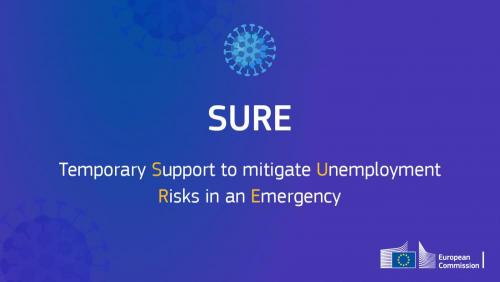
https://ec.europa.eu/commission/presscorner/detail/en/ip_20_1808
This announcement follows the Council's approval to grant financial support to 16 Member States under the SURE instrument to help protect jobs and people in work.
President of the European Commission, Ursula von der Leyen, said: “We are not only investing billions of euros to save jobs in Europe and reduce the social impact of the coronavirus pandemic, but we are also doing it by issuing social bonds. This will give investors the chance to contribute to our efforts and up to €100 billion will help keep people in jobs in our Member States.”
Commissioner Johannes Hahn, in charge of Budget and Administration, said: “The decision to issue the EU SURE bonds as social bonds will be a game changer for the global social bonds market. At the same time, it is a clear demonstration of the EU's long-term commitment to sustainable financing. I am very excited about today's announcement and looking forward to the forthcoming EU SURE issuance in the very near future.”
The funds raised will be transferred to the beneficiary Member States in the form of loans to help them cover the costs directly related to the financing of national short-time work schemes and similar measures as a response to the pandemic.
Today's Framework demonstrates to the investor community how the funds raised by SURE bond issuance will be used for a clearly identified objective: alleviating the social impact of the coronavirus pandemic and its consequences across the EU. Investors can therefore be confident that their investments in these bonds will be used to finance targeted social policy measures. At the same time, the Commission's Social Bond Framework will contribute to the further development of the social bond market which is one pillar of the European ‘Sustainable Finance' market.
In order to guarantee that the funds will be used for social purposes, the Social Bond Framework, underpinned by the SURE Regulation, requires Member States to report on how the borrowed funds have been spent. Under the Framework, Member States are also required to report on the social impact of the EU SURE bonds. Based on the information in these reports, the European Commission will be able to demonstrate to investors that the EU SURE bonds have been used to finance programmes with a positive social impact.
By preparing and presenting a Social Bond Framework, the Commission seeks to appeal to investors who want to put their funds to work for Environmental, Social and Corporate governance (ESG) purposes. The Commission's Social Bond Framework has been established in full compliance with the Social Bond Principles (SBP) published by the International Capital Market Association (ICMA). It has been independently evaluated by an external evaluator, Sustainalytics.
Following today's announcement, the Commission is moving one step closer towards the issuance of the first SURE bonds. The first transaction will follow in the second half of October.
Background
So far, 16 Member States will receive financial support under the SURE instrument to help protect jobs and keep people in work. Financial support will be provided in the form of loans granted on favourable terms from the EU to Member States. The Commission has today presented a proposal to the Council for a decision to grant €504 million in financial support to Hungary under the SURE instrument. Including Hungary, the Commission has now proposed a total of €87.8 billion in financial support under SURE to 17 Member States.
These loans will help Member States to cover the costs directly related to the financing of national short-time work schemes, and other similar measures they have put in place as a response to the pandemic, in particular for the self-employed. SURE could also finance some health-related measures, in particular at the work place, used to ensure a safe return to normal economic activity.
Member States can still submit formal requests for support under SURE, which has an overall firepower of up to €100 billion to help protect jobs and workers affected by the pandemic.
For more information










Add new comment